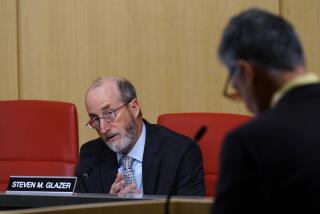Email tax may slice spam and scams out of inboxes
- Share via
SACRAMENTO — The most courageous politician in California — probably the nation — is a Berkeley city councilman, Gordon Wozniak. His gutsy act: proposing that the government tax email.
Yes, sacrosanct, time-gobbling, out-of-control email.
“I got a lot of nasty emails nationally,” he says.
“You are making Berkeley look really silly,” one person wrote. Another called him “the epitome of a communist — you and all your commy liberal idiots.”
Wozniak, however, is certified brainy — a retired nuclear scientist, a futurist who, he admits, may be ahead of his time about taxing email. “It’s a real uphill battle.”
But a battle worth waging.
Wozniak, 59, suggested taxing email during a recent council meeting as the city went on record opposing the sale of the Berkeley main post office and urging the Postal Service to maintain all its services there.
Postal officials have announced plans to stop delivering mail on Saturdays starting in August. Email and online billing have reduced the feasibility of — and need for — six-day snail mail delivery, they say.
An email tax — as part of a broader Internet tax — could raise money to help keep the Postal Service afloat, Wozniak told the council.
“There should be something like a bit tax,” he said. “I mean, a bit tax could be a cent per gigabit and they would make, probably, billions of dollars a year.... And there should be, also, a very tiny tax on email.”
I don’t know about taxing gigabits. I’m not even sure what they are.
But email I’m as familiar with as a nagging toothache. I spend way too much of my day, as do many workers who depend on computers, hitting the delete key or — even more time-consuming — routing spam into the junk file and trying to block out the arrogant sender forever.
Often the email is in a foreign language that’s all Greek to me. Or it’s spinning me on some Atlantic Coast congressional race that is of no interest whatsoever. I’m also not in the market for awnings or pet food or a “tactical robot.” And, no, I really don’t care about the “Amway Boycott” or that “the National Farmers Union Endorses Raw Milk.”
So leave me alone. And stop clogging my inbox.
There also are the scam scum. No, I wasn’t aware that I had just won the $25-million online lottery and the check would be sent as soon as I turn over my personal info. Nor am I interested in the woman who wants to “share her love.”
You get the idea. I’m not nearly as concerned about keeping snail mail afloat as fending off these spammers and scammers and denying them free access to my work station. Make them pay. Maybe it’ll be a deterrent.
If the Postal Service were to receive the tax money, fine.
Or it could be used to place a laptop on every school kid’s desk. Or blanket the country with Wi-Fi. Or combat Chinese hackers. Maybe chase after scammers.
Or just to help replace the tax revenue lost by technology putting people out of work. That was the idea of the Canadian economist — Wozniak’s inspiration — who first raised the notion of a bit tax back in 1997 in a speech at Harvard Law School.
“Needed: new taxes for a new economy,” asserted Arthur J. Cordell, then an information technology advisor for the Canadian government. “The new wealth of nations is to be found in the trillions of digital bits of information pulsing through global networks….
“The move to a new economy should be matched by consideration of a new tax base, a tax base that is growing.... Why not examine a possible tax on the digital traffic of the Information Highway?”
President Clinton and Congress responded the next year by enacting the Internet Tax Freedom Act banning any taxation of bits or email. The act is scheduled to expire next year, but most likely will be extended. Washington politicians, after all, hire other people — on the taxpayers’ dime — to handle their spam.
I phoned Cordell in Ottawa, where he’s a professor at Carleton University.
He’s still pushing a bit tax. “It’s needed more than ever as we get rid of brick and mortar stuff,” he said, adding: “We’re wealthier as a society than we think we are because so much stuff is free. I use Google all day long....
“We’re passing up a great source of taxation. It’s out there, and it’s not going away. Eventually it’s going to happen.”
“Email would be easy to tax,” he continued. “The Internet service provider could bill it.”
Wozniak says he’s through pushing it. “I’m not going to do any more than what I’ve done. It’s not something the City of Berkeley can do on its own.”
Here’s how I’d set it up:
Emailing within a company would be tax-free. I’d allow everyone a certain number of untaxed, private emails a month — 100, maybe 200. After that, each message would cost one cent, up to a certain size. If they ran off the screen, they’d cost extra — just as a bulky letter costs more than a 46-cent stamp.
After 500 emails, the fare would be hiked to 2 cents to discourage the junk-mailers. Copy 500 people on one message, that’s 500 emails.
Probably 99% of us wouldn’t pay much tax at all.
I don’t know how many emails are tapped out daily in California or the U.S. But it’s estimated that 204 million are sent worldwide every minute — 145 billion a day.
It just seems like most are landing in my inbox.
Cellphones are taxed. Email should be too — to save it from the spammers and scammers.
More to Read
Sign up for Essential California
The most important California stories and recommendations in your inbox every morning.
You may occasionally receive promotional content from the Los Angeles Times.














